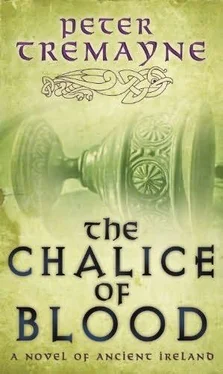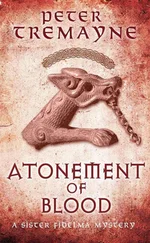Peter Tremayne - Chalice of Blood
Здесь есть возможность читать онлайн «Peter Tremayne - Chalice of Blood» весь текст электронной книги совершенно бесплатно (целиком полную версию без сокращений). В некоторых случаях можно слушать аудио, скачать через торрент в формате fb2 и присутствует краткое содержание. Жанр: Исторический детектив, на английском языке. Описание произведения, (предисловие) а так же отзывы посетителей доступны на портале библиотеки ЛибКат.
- Название:Chalice of Blood
- Автор:
- Жанр:
- Год:неизвестен
- ISBN:нет данных
- Рейтинг книги:5 / 5. Голосов: 1
-
Избранное:Добавить в избранное
- Отзывы:
-
Ваша оценка:
- 100
- 1
- 2
- 3
- 4
- 5
Chalice of Blood: краткое содержание, описание и аннотация
Предлагаем к чтению аннотацию, описание, краткое содержание или предисловие (зависит от того, что написал сам автор книги «Chalice of Blood»). Если вы не нашли необходимую информацию о книге — напишите в комментариях, мы постараемся отыскать её.
Chalice of Blood — читать онлайн бесплатно полную книгу (весь текст) целиком
Ниже представлен текст книги, разбитый по страницам. Система сохранения места последней прочитанной страницы, позволяет с удобством читать онлайн бесплатно книгу «Chalice of Blood», без необходимости каждый раз заново искать на чём Вы остановились. Поставьте закладку, и сможете в любой момент перейти на страницу, на которой закончили чтение.
Интервал:
Закладка:
‘It is curious,’ Fidelma agreed.
‘Perhaps he murdered Brother Donnchad?’
‘If he did, then he is very stupid to go around trying to stop people speaking to us. It would arouse their suspicions if not ours, and eventually it would get back to us. As it is, I thought the physician’s performance was bizarre and now the smith has explained it. The man was probably trying to obey the steward’s orders. We will have to watch Brother Lugna very carefully.’
A bell started to ring in the distance.
‘What is that?’ demanded Eadulf, raising his head.
‘Judging from the position of the sun,’ Fidelma said, looking up, ‘I would say that it is the bell to summon the community for the eter-shod — the midday meal. It has been an interesting and exhausting morning and I, for one, would welcome some refreshment.’
CHAPTER SEVEN
Abbot Iarnla walked across to their table as they were rising to leave when the midday meal had finished. The community took three meals a day. The custom was to rise at dawn, wash one’s face and hands, and break one’s fast with a light meal. The eter-shod , or ‘middle meal’, was taken when the sun was at its zenith. Thankfully, it appeared that Glassán and his assistant Saor ate their midday meal on site and so they were spared another monologue on his craft. Gormán was happily occupying his time fishing along the banks of The Great River. Only Fidelma and Eadulf had been seated at their table.
‘I hope you have had a productive morning,’ Abbot Iarnla greeted them anxiously. ‘Have you reached any conclusions?’
‘We are far from any conclusions yet,’ replied Fidelma. ‘There are many questions that still need to be asked before we can proceed to judgement.’
Abbot Iarnla looked about almost furtively and then, as if assuring himself that no one was observing him, dropped his voice and said, ‘I trust you will forgive me for seating you here, Fidelma. As sister to our King, I considered it more appropriate for you and Eadulf to sit alongside me. However, Brother Lugna informs me that Church customs in Rome …’ He hesitated, not sure how to proceed.
‘We are content here, Abbot Iarnla,’ Fidelma replied softly. ‘Brother Lugna has made no secret of his resent ment of our presence here. We would not wish to impose on him more than we have to.’
‘I apologise for him. He is inflexible when it comes to the rules that he has drawn up for the community.’
‘Rules that he has drawn up?’ Fidelma was surprised. ‘I thought the drawing up of rules for the community was the prerogative of the abbot?’
‘He believes that the brethren were too lax and free of discipline and order,’ the abbot confessed. ‘Times change, I suppose. I have tried to run things in the spirit of our blessed founder, Mo-Chuada, but, as you know, the Faith is changing. New ideas are coming in from Rome. So I have been persuaded to let Brother Lugna pursue his course of action to strengthen the community.’
Fidelma was about to say that perhaps he was abrogating too much authority to his young steward but the abbot suddenly turned and motioned to a man who was helping an elderly member of the community along the aisle between the tables towards the door. The younger man hesitated and then guided his companion towards them.
The elderly man could barely walk without the help of the young man’s arm and a stout stick he carried in his other hand. His skin was stretched tight on his face, which was white as parchment. His grey eyes were wide, staring and watery. The lips were thin and almost bloodless. He had no hair at all save the white stubble over his chin and upper lip where he had been badly shaved. Flecks of spittle adhered to the corners of his mouth. He could have been any age from four score to a century.
His companion was at no more than three decades in age, with features Fidelma would have described as ugly. His skinwas sallow and although he was clean-shaven, the cheeks and chin had a bluish hue, suggesting a thick beard would result if no altan , or razor, were applied. His blue-black hair was closely cropped, which was unusual, as both men and women usually wore their hair long, as a mark of beauty. He wore the tonsure of the Irish. The eyes were dark and it was almost impossible to discern the pupils. He had a bulbous nose and thick lips, with a protruding lower lip. The half-open mouth displayed badly kept teeth. Fidelma’s eyes dropped to the man’s hands and, as she suspected, the man had unkempt nails which were a sign of ill-breeding. It was the custom among the wealthier classes of her people to keep fingernails cut and carefully rounded. He was not a tall man nor well-built. He looked like someone whose meals were sparse and infrequently come by. His whole appearance gave the impression of melancholy subservience.
The abbot introduced him. ‘This is Brother Gáeth. He was Brother Donnchad’s anam chara . I know you wanted to talk to him.’
At that moment the elderly man peered at Fidelma, his eyes narrowing, and he moved closer to her. There seemed a look of hope on his thin features. Then he sighed, shook his head and said in a disappointed tone, ‘You are not an angel.’
The abbot appeared embarrassed but Fidelma merely smiled at the old man.
‘I am not. I am Fidelma of Cashel.’
The old man was still shaking his head.
‘No angel,’ he muttered.
‘This is the Venerable Bróen, Fidelma.’ The abbot offered the introduction in an apologetic tone. ‘He was with Mo-Chuada when the abbey was founded. Alas, he is a little … a little …’
‘I have seen an angel,’ the old man interjected, speaking in a confidential voice.
Fidelma humoured him. ‘That does not fall to the lot of everyone,’ she replied solemnly. ‘You must be blessed.’
The Venerable Bróen sighed deeply. ‘I saw an angel. The blessed one of God flew in the sky. I saw it.’
‘Forgive me, Fidelma,’ Abbot Iarnla said hurriedly. ‘I wanted to introduce you to Brother Gáeth. Brother Gáeth, remain here with the dálaigh and I will take the Venerable Bróen back to his cubiculum .’ So saying, he took the old man’s arm and began to lead him away.
They heard the Venerable Bróen’s petulant tone. ‘I did see the angel. I did. It came to take the soul of poor Brother Donnchad. I saw it flying in the wind.’
Brother Gáeth remained standing before them with downcast eyes. To Fidelma, he did not look the sort of person to become the soul friend of an intellectual and scholar such as Brother Donnchad had been. Then she remembered the words from Juvenal’s Satires and felt guilty: fronti nulla fides , no reliance can be placed on appearance.
Fidelma waved to the table they had just risen from.
‘Be seated, Brother,’ she instructed, reseating herself. Eadulf followed her example, while Brother Gáeth moved slowly to the far side of the table and lowered himself on to the bench, his eyes still downcast.
‘I am afraid I know nothing of Brother Donnchad’s death,’ he volunteered. The words came out in something of a rush. ‘He had not spoken to me in days and told me to leave him alone.’
‘So when was the last time you spoke to him?’
‘About two or three days before his death.’
‘How long had you known him?’
‘Twenty-five years.’ The answer was without hesitation.
‘That is a long time,’ commented Eadulf. He had estimated Brother Gáeth’s age at no more than thirty-five.
‘I was his soul friend … at one time.’
‘Tell us about him,’ encouraged Fidelma. ‘Firstly, though, tell us something of yourself and how you met him.’
‘I was a field worker of the class of daer-fudir .’
Читать дальшеИнтервал:
Закладка:
Похожие книги на «Chalice of Blood»
Представляем Вашему вниманию похожие книги на «Chalice of Blood» списком для выбора. Мы отобрали схожую по названию и смыслу литературу в надежде предоставить читателям больше вариантов отыскать новые, интересные, ещё непрочитанные произведения.
Обсуждение, отзывы о книге «Chalice of Blood» и просто собственные мнения читателей. Оставьте ваши комментарии, напишите, что Вы думаете о произведении, его смысле или главных героях. Укажите что конкретно понравилось, а что нет, и почему Вы так считаете.











